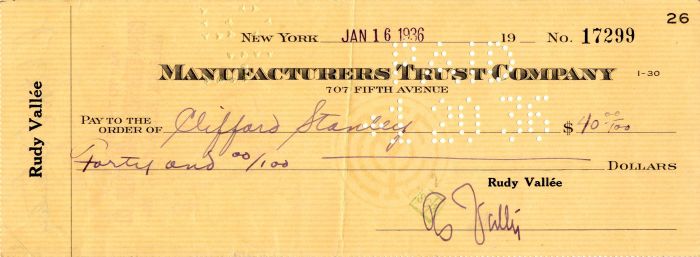Check signed by Rudy Vallee
Inv# AU1523 Autograph
Check signed by entertainer Rudy Vallee.

Hubert Prior Vallée (July 28, 1901 – July 3, 1986), known professionally as Rudy Vallée, was an American singer, musician, actor, and radio host. He was one of the first modern pop stars of the teen idol type. He was born in Island Pond, Vermont, on July 28, 1901, the son of Catherine Lynch and Charles Alphonse Vallée. His maternal grandparents were Irish, while his paternal grandparents were French-Canadians from Quebec. Vallée grew up in Westbrook, Maine. On March 29, 1917, he enlisted to fight in World War I, but was discharged when U.S. Navy authorities discovered he was only 15 years old. He had enlisted in Portland, Maine, under the false birth date of July 28, 1899. He was discharged at the Naval Training Station in Newport, Rhode Island, on May 17, 1917, after 41 days of active service.
After playing drums in his high school band, Vallée played clarinet and saxophone in bands around New England as a teenager. From 1924 through 1925, he played with the Savoy Havana Band at the Savoy Hotel in London, where band members discouraged his attempts to become a vocalist. He returned to the United States, briefly attending the University of Maine. He received a degree in philosophy from Yale University, where he played in the Yale Collegians with Peter Arno, who became a cartoonist for The New Yorker magazine.
After graduation, he formed Rudy Vallée and the Connecticut Yankees, having named himself after saxophonist Rudy Wiedoeft. With this band (formed in 1928), which included two violins, two saxophones, a piano, a banjo, and drums, he started singing. He had a thin, wavering tenor voice and seemed more at home singing sweet ballads than jazz songs. But his singing, suave manner, and boyish good looks attracted attention, especially from young women. Vallée was given a recording contract, and in 1928 he started performing on the radio. He became one of the first crooners. Singers needed strong voices to fill theaters in the days before microphones. Crooners had soft voices that were suited to the intimacy of radio; the microphones, in this case, promoted direct access to "a vulnerable and sensuous interior," or in other words, "a conjured intimacy." Vallée's trombone-like vocal phrasing on "Deep Night" would inspire Bing Crosby, Frank Sinatra, and Perry Como to model their voices on jazz instruments.
Vallée was one of the first celebrity pop stars. Flappers pursued him wherever he went. His live appearances were usually sold out. Among screaming female fans, his voice failed to project in venues without microphones and amplification, so he often sang through a megaphone. A caricature of him singing this way was depicted in the Betty Boop cartoon Poor Cinderella (1934). Another caricature is in Crosby, Columbo, and Vallee, which parodies him, Bing Crosby, and Russ Columbo.
In the words of a magazine writer in 1929, At the microphone he is truly a romantic figure. Faultlessly attired in evening dress, he pours softly into the radio's delicate ear a stream of mellifluous melody. He appears to be coaxing, pleading and at the same time adoring the invisible one to whom his song is attuned.
Vallée had his share of detractors as well as fans when his popularity was at its height. Radio Revue, a radio fan magazine, held a contest in which people wrote letters explaining his success. The winning letter, written by a man who disliked Vallee's music, said, "Rudy Vallee is reaping the harvest of a seed that is seldom sown this day and age: LOVE. The good-looking little son-of-a-gun really and honestly LOVES his audience and his art. He LOVES to please listeners—LOVES it more than he does his name in the big lights, his mug in the papers. He loved all those unseen women as passionately as a voice can love, long before they began to purr and to caress him with two-cent stamps."
Vallée made his first records in 1928 for Columbia's low-priced labels Harmony, Velvet Tone, and Diva. He signed to RCA Victor in February 1929 and remained with the company through 1931, leaving after a heated dispute with executives over song selections. He then recorded for the short-lived Hit of the Week label which sold rather poor quality records laminated onto a cardboard base. In August 1932, he signed with Columbia and remained with the label through 1933; Valée returned to RCA Victor in June 1933; his records were initially issued on Victor's low-priced Bluebird label until November 1933, when he was back on the standard Victor label. He remained with RCA Victor until signing with ARC in 1936. ARC issued his records on the Perfect, Melotone, Conqueror and Romeo labels until 1937, when he again returned to RCA Victor.
With his group the Connecticut Yankees, Vallée's best-known recordings include "The Stein Song" (a.k.a. University of Maine school song) in 1929[10] and "Vieni, Vieni" in the latter 1930s.
His last hit record was a reissue of "As Time Goes By", popularized in the 1942 film Casablanca. Due to the 1942-44 AFM recording ban, RCA Victor reissued the version he had recorded in 1931. During World War II, he enlisted in the United States Coast Guard to help direct the 11th district Coast Guard band as a Chief Petty Officer. He was promoted to Lieutenant and led the 40 piece band to great success. In 1944 he was placed on the inactive list and returned to radio.
According to George P. Oslin, Vallée on July 28, 1933 was the recipient of the first singing telegram. A fan telegraphed birthday greeting, and Oslin had the operator sing "Happy Birthday to You".









Ebay ID: labarre_galleries